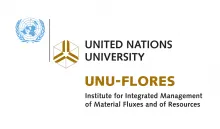The United Nations University (UNU) was established as an autonomous organ of the United Nations (UN) by General Assembly resolution 2951 (XXVII) of 11 December 1972.
The UNU shall enjoy the status, privileges and immunities provided in Articles 104 and 105 of the UN Charter, the Convention on the Privileges and Immunities of the United Nations (General Convention), other international agreements and UN resolutions relating to the status, privileges and immunities of the UN and its entities.
By way of its Charter, the UNU has the legal status necessary for the realization of its purposes and activities. It shall have the capacity to enter into agreements, contracts or arrangements, acquire and dispose of immovable and movable property, and institute legal proceedings.
The United Nations University Institute for Integrated Management of Material Fluxes and of Resources (UNU-FLORES) was established by the UNU governing board (UNU Council) as a research and training programme of UNU.
By way of its Statute, UNU-FLORES:
- Is an integral part of UNU;
- Has the legal status necessary for the realization of its purposes and activities; it shall, in particular, have the capacity to enter into agreements, contracts or arrangements, acquire and dispose of immovable and movable property, and institute legal proceedings;
- Enjoys the privileges, immunities and facilities which may be required for the proper exercise of its functions; and,
- Enjoys, within the framework of Article II paragraph 1 of the UNU Charter, the academic freedom required for the achievement of its purposes and the conduct of its activities within the overall University programme, with particular reference to the choice of subjects and methods of research, training and capacity development, the selection of persons and institutions to share in its tasks, and freedom of expression.
Nothing in this document shall be deemed to be a waiver, express or implied, of the privileges and immunities of the United Nations, including UNU, which is an autonomous organ of the General Assembly thereof, or of UNU-FLORES which is an integral part of UNU.
The possible participation of UNU-FLORES in the Global Partnership for Sustainable Development Data shall be subject to, and without wavier of, the privileges, immunities, facilities and exemptions of the
United Nations and shall not violate UNU or UNU-FLORES’s Regulations, Rules, Organisation Directives, Instructions and any other parts of its regulatory framework, as well as its policies, and procedures.
Priorities as a partner of the Global Partnership for Sustainable Development Data
UNU-FLORES develops strategies to resolve pressing issues in the sustainable use and integrated management of environmental resources such as water, soil, waste, energy, and other geo-resources that are of concern to the United Nations and its Member States – particularly in developing and emerging economies.
Based in Dresden, Germany, the Institute engages in research, capacity development, postgraduate teaching, advanced training, and knowledge dissemination to advance the Resource Nexus.
In this context, data availability and accessibility play key roles, especially in the Global South. Analyzing complex data, and developing insights through the use of mathematical modelling, predictive modelling, data mining, and data visualization techniques to create innovative approaches to answer pertinent research questions is crucial for research, education, and capacity development for the Resource Nexus.
UNU-FLORES seeks to contribute to the achievement of the UN Sustainable Development Goals (SDGs). The Institute harnesses the power of data through Resource Nexus thinking to provide stakeholders – academics, practitioners, and decision makers – evidence-based policy guidance. The improved access to disaggregated data and tools is a priority for the work of UNU-FLORES.
